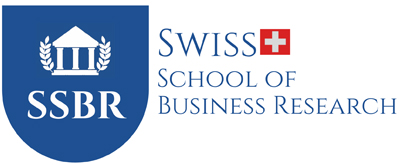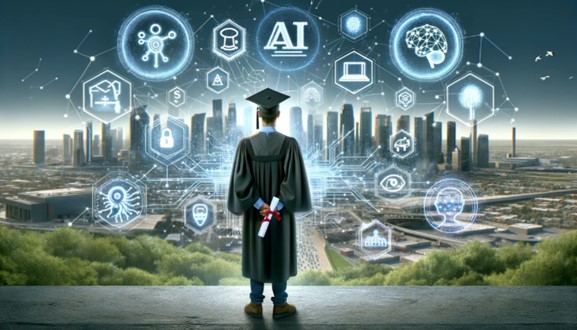AI in higher education is a rapidly evolving phenomenon. It’s not just about sophisticated algorithms and data analytics; it’s about fundamentally transforming the way we teach, learn, and engage with knowledge. AI encompasses a range of technologies including machine learning, natural language processing, and predictive analytics, all tailored to enhance the educational experience. From personalized learning paths to automated administrative tasks, AI is reshaping the academic world.
However, there’s a prevailing misconception that needs addressing. Too often, AI is viewed through a narrow lens, perceived as a tool synonymous with plagiarism or academic cheating. This viewpoint not only undermines the vast potential of AI but also ignores its transformative impact on learning and teaching methodologies. AI is not a shortcut for students or a threat to academic integrity. Instead, it’s a powerful ally in the quest for deeper, more effective, and inclusive educational experiences.
Thus, our thesis is clear and emphatic: AI is a positive force in higher education, a catalyst for innovation and improvement. It’s not just changing the way we approach learning and teaching; it’s revolutionizing it. AI is an invaluable asset, pushing the boundaries of what’s possible in education and opening doors to new ways of understanding and interacting with the world. It’s time to embrace AI as a fundamental component of modern education, not as a tool for cheating, but as a force for good, capable of enriching and elevating the educational landscape.
The Misconception of AI in Academia
One of the most prevalent misconceptions about artificial intelligence (AI) in academia is its association with plagiarism and academic dishonesty. This fear often stems from the belief that AI makes it easier for students to generate essays or solve problems without truly engaging with the material. Critics argue that AI tools could encourage a culture of shortcut-taking, reducing the emphasis on critical thinking and originality. However, this view overlooks the broader and more constructive role of AI in education.
AI is not a one-dimensional tool designed to churn out essays or solve equations on behalf of students. Instead, it should be viewed as a multifaceted educational resource. For instance, AI-driven plagiarism detection tools are actually enhancing academic integrity. These tools can analyze vast databases of academic work, identifying potential plagiarism more efficiently than ever before. Far from encouraging dishonesty, AI is a powerful ally in preserving the originality and authenticity of academic work.
AI as a Dynamic Learning Assistant
AI’s true potential lies in its capacity to act as a dynamic learning assistant, augmenting the educational process rather than undermining it. One key aspect of this is personalized learning. AI algorithms can adapt to individual learning styles and paces, offering customized resources and feedback. This adaptability ensures that students are not just passively receiving information but are engaging with materials in a way that aligns with their unique learning needs.
Moreover, AI tools can provide real-time feedback to students, a feature particularly useful in large classes where individualized attention from instructors may be limited. This feedback is not just about right or wrong answers but can include guidance on improving problem-solving approaches, enhancing understanding, and encouraging critical thinking.
In addition to personalized learning, AI can simulate complex real-world problems, providing students with practical, hands-on experience in a safe and controlled environment. This application is particularly valuable in fields like medicine, engineering, and environmental science, where real-life training scenarios can be difficult to replicate.
Furthermore, AI can help bridge gaps in educational access. For students in remote or underserved areas, AI-powered educational platforms can offer high-quality resources and experiences that might otherwise be inaccessible. This democratization of education is a crucial step towards a more equitable academic landscape.
The association of AI with plagiarism and academic cheating is a narrow and misleading perspective. AI in academia is not a shortcut to academic success but a tool to enhance the educational journey. It’s about creating a more personalized, inclusive, and effective learning environment. By understanding and embracing the multifaceted role of AI, educators and students alike can unlock its full potential, ensuring it serves as a companion in the pursuit of knowledge and innovation.
Enhancing Personalized Learning
Artificial Intelligence (AI) is revolutionizing personalized learning by tailoring educational experiences to meet the unique needs and learning styles of individual students. This bespoke approach is made possible through AI’s ability to analyze large amounts of data on student performance, learning habits, and preferences. For example, AI algorithms can identify patterns in a student’s interaction with digital learning materials, enabling the system to adjust the difficulty level of tasks, suggest additional resources, or provide customized feedback. This leads to a more engaging and effective learning experience, as students receive support that is specifically aligned to their personal learning journey.
One notable example of AI-driven personalized learning is Carnegie Learning’s “MATHia” platform. This system uses AI to provide a personalized math learning experience for students. It adapts in real-time to each student’s responses, offering hints, feedback, and level adjustments to suit their learning pace. Another example is Duolingo, a language learning app. It employs AI to adapt lessons according to the user’s proficiency level and learning speed, ensuring that each lesson is challenging yet achievable. These platforms demonstrate how AI can create a more dynamic and responsive learning environment, significantly enhancing the educational experience.
Facilitating Research and Innovation
In the realm of research and innovation, AI has become an indispensable tool, aiding in complex data analysis and accelerating new discoveries. AI’s ability to process and analyze large datasets with speed and precision is invaluable in research fields that deal with vast amounts of information, such as genomics, climate science, and material science. By sifting through data more efficiently than humans, AI can identify patterns and connections that might otherwise remain undiscovered, leading to breakthroughs and new insights.
Improving Accessibility and Inclusivity
Artificial Intelligence (AI) is playing a pivotal role in making education more accessible and inclusive, especially for students with disabilities. By leveraging technologies like speech recognition, AI can assist students with visual or hearing impairments in accessing course materials. For example, text-to-speech software allows visually impaired students to ‘hear’ written content, while speech-to-text systems enable students with mobility or dexterity issues to ‘write’ using their voice. Furthermore, AI-driven educational tools are capable of adapting to the unique learning needs of students with learning disabilities, offering customized support that can make a significant difference in their educational experience. Beyond aiding those with disabilities, AI is also breaking down language barriers. Translation and language learning tools, enhanced by AI, are enabling students from diverse linguistic backgrounds to access educational resources in their native languages, fostering a more inclusive and culturally diverse learning environment. This multifaceted approach to accessibility and inclusivity is not only leveling the educational playing field but is also nurturing a more diverse and inclusive academic community.
Streamlining Administrative Tasks
AI’s application in streamlining administrative tasks in education is freeing up valuable time for educators, allowing them to focus more on teaching and less on bureaucracy. AI-powered systems are capable of automating various administrative tasks such as enrollment processes, attendance tracking, and even grading. For instance, AI algorithms can swiftly process enrollment applications, sorting and ranking them based on predefined criteria, thus speeding up the admission process. In grading, AI tools are now able to evaluate and provide feedback on student essays, quizzes, and other assignments, not just for objective, right-or-wrong answers but also for more subjective responses. This automation reduces the workload on teachers, enabling them to dedicate more time to student interaction, curriculum development, and personalized teaching. By handling these mundane but essential tasks, AI is enhancing administrative efficiency in educational institutions, leading to a more streamlined and focused educational environment.
Fostering Academic Integrity
AI tools are increasingly important in maintaining and fostering academic integrity in educational institutions. Plagiarism detection software, one of the most widely used AI tools in academia, scans student submissions against a vast database of academic work to identify potential plagiarism. This technology not only helps in upholding the standards of academic honesty but also acts as a deterrent against academic misconduct. Beyond detection, AI can also be employed as an educational tool, teaching students about ethical research and writing practices. Through AI-driven tutorials and exercises, students can learn about proper citation, the importance of originality in academic work, and the consequences of academic dishonesty. These AI-powered educational experiences are integral in instilling a strong sense of academic ethics in students, preparing them not just for academic success but for responsible and ethical participation in their future professional fields. In this way, AI is not just a policing tool, but a foundational element in building a culture of integrity and honesty in the academic world.
Preparing Students for the Future
In an increasingly AI-driven job market, equipping students with AI literacy and skills is crucial for their future success. Learning about and with AI prepares students not just in understanding the technology itself, but in developing a suite of complementary skills that are highly valued in the modern workplace. These skills include problem-solving, critical thinking, and adaptability. As AI continues to evolve and impact various sectors, students who are familiar with AI technologies and concepts will have a significant advantage. They learn to collaborate with AI systems, understand their capabilities and limitations, and apply this knowledge to real-world scenarios. This preparation is not limited to technical fields; understanding AI is becoming essential across disciplines, from business to healthcare, making it an indispensable part of a well-rounded education.
Addressing Challenges and Ethical Considerations
Implementing AI in education comes with its share of challenges, including ethical considerations and the risk of widening the digital divide. Concerns about data privacy, bias in AI algorithms, and equitable access to technology are paramount. To overcome these challenges, educational institutions must adopt thoughtful policies and practices. This includes investing in infrastructure to ensure all students have access to AI tools, training educators to use AI ethically and effectively, and developing curricula that address the ethical dimensions of AI. Additionally, collaboration with tech companies and policymakers can help ensure that AI in education is developed and used in ways that are fair, transparent, and beneficial to all students. By tackling these challenges head-on, the educational sector can harness the full potential of AI while maintaining a commitment to ethical standards and equality.
Conclusion
The integration of AI in higher education holds immense transformative potential, reshaping how we teach, learn, and think about education. As we stand at the forefront of this technological revolution, it is crucial to embrace AI not as a mere tool for efficiency, but as a catalyst for innovation, inclusivity, and personal growth. The future of education is intertwined with AI, promising a dynamic and adaptive learning environment that prepares students for the challenges and opportunities of the 21st century. Let’s continue the conversation and exploration of AI in academia, asking ourselves: How can we further harness AI to unlock the full potential of every student and educator, and what steps can we take today to build a more intelligent, inclusive, and inspiring educational landscape for tomorrow?
At Swiss School of Business Research (SSBR), we are at the forefront of integrating Artificial Intelligence (AI) into higher education. Recognizing AI’s transformative power, we’ve enthusiastically adopted technologies like Bard and ChatGPT in our curriculum, online classrooms, and marketing strategies. Our focus is on harnessing AI to enrich the educational experience – offering personalized tutoring, fostering critical thinking, and cultivating interactive learning environments. These steps signify our commitment to remaining at the forefront of educational innovation, ensuring our students are well-equipped for the ever-evolving business world. Embracing AI not only aligns with our mission to provide a progressive and impactful learning journey but also reflects our dedication to shaping future-ready professionals.

